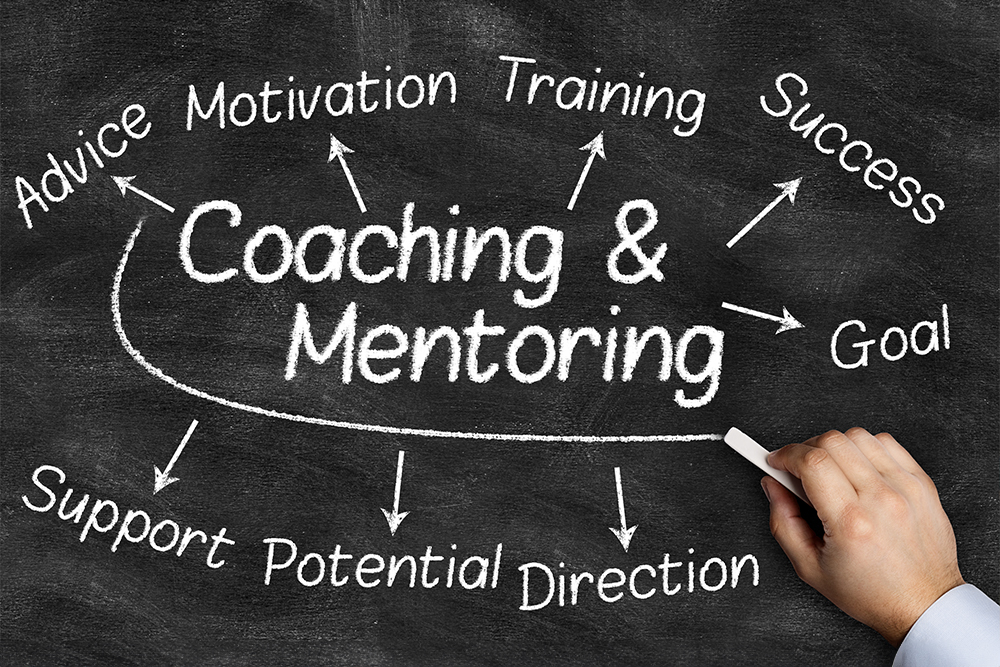
There’s an educational theory known as the Zone of Proximal Development (ZPD). ZPD theory suggests new skills can only be mastered with guidance from a more knowledgeable individual. This is why we spend most of our time as students in the ZPD, taking instruction from a teacher or lecturer. But at work, we’re often left to fend for ourselves.
Some employers recognise this as the wrong approach and arrange for coaching, typically from external experts. Alternatively, employees can be paired with a more experienced colleague who becomes a mentor. If you’re faced with a choice between coaching vs. mentoring, you need to be aware of a few significant differences – all of which are below.
What is Mentoring?
Mentoring generally refers to a learning relationship between a junior employee and a more experienced colleague. Much of the learning happens on the job, with mentors typically sharing work hours or departments with their mentees. This arrangement makes mentoring typically less formal than coaching.
The overlap in roles or responsibilities between mentor and mentee is another advantage. The best mentors have been in the junior colleague’s position, letting them give relevant, practical guidance based on first-hand experience. Advice can be made even more specific in more organised mentoring relationships, such as when an employee is primed for a particular role or promotion.
Mentoring relationships are also typically more personable. Mentees trust the advice given because they know and respect the mentor (and appreciate the mentor has previously been in their position, too). Mentors are also usually on hand to offer immediate advice. They are readily available when needed, compared with the planned sessions typical of coaching.
Finally, mentoring relationships are longer than coaching counterparts. Personal development can be drawn out when it happens more organically in the workplace and is led by a colleague. Mentoring can also be more reactive, with mentees seeking advice on whatever comes up during their everyday work.
What is Coaching?
Coaching refers to a learning relationship between someone and an outside expert. A critical difference between a mentor and coach is the expert part; coaching is its own profession, which should only be undertaken by specialists.
Sports coaching is a good example. An athlete wants to get better at their chosen discipline, so they enlist an expert in that field to train them towards a specific goal, like running faster or lifting more weight. A coach will plan how they’ll get their client to achieve their goals and schedule sessions or exercises to get them there.
At work, you might want coaching in presenting, for example. Your coach – an expert on presentations – will plan sessions to train the skills needed to reach your objective. One session might focus on projecting your voice, another on controlling your body language. After the programme, you should have developed the qualities of an exceptional presenter.
A defined endpoint also means that coaching relationships are typically shorter. The coaching stops after you achieve your goals (or finish the agreed programme). Or you might move on to a new training programme designed for a different outcome, which a different coach will probably manage.
Communication Skills Training
Our Communication Skills Training courses provide employers, managers and their employees with the fundamental aspects of effective communication for the success of businesses, organisations and individuals. It helps employers build constructive relationships with their workforce.
Difference Between Coach and Mentor
Both coaching and mentoring are proven forms of personal development. They enable learning from a more knowledgeable person.
Because of this common DNA, both share some typical features:
- Learning is usually 1:1, built around open conversations
- Successful outcomes depend on commitment from all parties involved
- Areas covered are specific to the learner
And, of course, coaching and mentoring help raise your performance or abilities.

Benefits of Coaching and Mentoring
Overlaps between coaching and mentoring also create mutual benefits.
Both Give You an Outside Perspective
Any personal development requires a level of self-awareness. After all, you need to accept there’s something you could do better to agree to coaching or mentoring in the first place. But you don’t know what you don’t know, meaning we often can’t precisely define what’s preventing progress. Coaches and mentors have an outside perspective (and knowledge) that lets them pinpoint what’s holding us back.
Opportunities to Talk Through Challenges
Whether you’re a mentee or being coached, the opportunity to talk through challenges with someone more knowledgeable helps you reach better conclusions faster. Coaches and mentors (especially mentors) also give you a non-judgemental figure to bounce ideas off or pose questions you wouldn’t feel comfortable asking your boss. This freedom helps you be bolder in your thinking and could boost innovation.
Holding You Accountable
Good intentions don’t consistently deliver tangible outcomes. Not only can coaches and mentors give you feedback to improve, but they can also motivate you. This motivation can come from the relationship you develop with your mentor or coach or knowing you’ll have to present something at your next meeting.
Do I Need Coaching or Mentoring?
Feeling comfortable at the front of your classroom or behind your desk is natural. But the entire space is yours, so use it. Circulate around the room, teach from the back or hover over the shoulder of that one learner who’s clearly not listening.
The debate around coaching vs. mentoring is sometimes settled by your workplace and what schemes are available. But if you’re in the position to choose, it’s necessary to consider your situation and how you learn best.
Some people prefer the structure and expertise offered by coaching. If you have a specific goal and timeframe, a coach is probably the best person to help you realise your objectives.
Others might opt for mentoring, preferring the ad-hoc learning opportunities it offers and the more relaxed approach.
One final point to consider is proof of development. Because mentor relationships are loosely defined, they rarely come with any certification. Certificates aren’t always guaranteed with coaching, but some come with evidence of completion since they follow a defined programme. These certificates let you instantly prove your skills to other employers or stakeholders outside your orbit. The value of any certificate is helped by the coach’s credentials or the standing of the organisation they represent.
Online Training – Another Option for Personal Development
Online training is a third option for personal development. You might miss out on 1:1 feedback but still get the advantages of mentoring and coaching. Online training allows you to learn at your own pace and plan lessons when working towards a defined outcome.
Our online Communication Skills Training is a great place to start. The ability to communicate is relevant in every role and workplace. You can express yourself more clearly and understand others, letting you voice your opinions confidently and build relationships quickly. These skills are proven by an independently accredited certificate issued by one of the UK’s largest training providers.





















